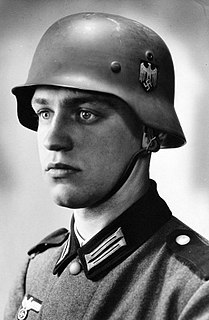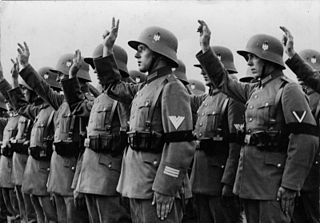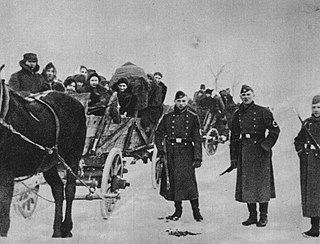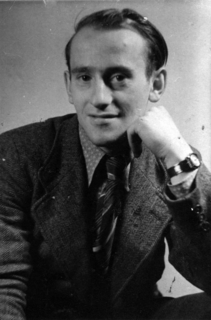Related Research Articles

Noir is a 26-episode Japanese anime television series created and written by Ryōe Tsukimura and produced by Victor Entertainment and Bee Train. The series was directed by Kōichi Mashimo, with Yoko Kikuchi, Minako Shiba and Satoko Miyachi in charge of character designs, Kenji Teraoka in charge of mechanical design, and Yuki Kajiura composing the music. The DVD version was released by ADV Films in North America and the United Kingdom and by Madman Entertainment in Australia and New Zealand.

Kristallnacht or the Night of Broken Glass, also called the November pogrom(s), was a pogrom against Jews carried out by the Nazi Party's Sturmabteilung (SA) paramilitary forces along with civilians throughout Nazi Germany on 9–10 November 1938. The German authorities looked on without intervening. The name Kristallnacht comes from the shards of broken glass that littered the streets after the windows of Jewish-owned stores, buildings and synagogues were smashed. The pretext for the attacks was the assassination of the German diplomat Ernst vom Rath by Herschel Grynszpan, a 17-year-old German-born Polish Jew living in Paris.

Ernst Jünger was a philosopher, a highly decorated Imperial German soldier, author, and entomologist who became publicly known for his World War I memoir Storm of Steel.

Erich Fried was an Austrian-born poet, writer and translator. He initially became known to a broader public in both Germany and Austria for his political poetry, and later for his love poems. As a writer he mostly wrote plays and short novels. He also translated works by different English writers from English into German, most notably works by William Shakespeare.

Lion Feuchtwanger was a Bavarian Jewish novelist and playwright. A prominent figure in the literary world of Weimar Germany, he influenced contemporaries including playwright Bertolt Brecht.
Mischling was a pejorative legal term used in Nazi Germany to denote persons of both "Aryan" and non-Aryan, such as Jewish ancestry as codified in the Nuremberg racial laws of 1935. In German, the word has the general denotation of hybrid, mongrel, or half-breed. Outside its use in official Nazi terminology, the term Mischlingskinder was later used to refer to war babies born to non-white soldiers and German mothers in the aftermath of World War II.
Abraham (Abram) Leon (1918–1944), was a Belgian Jewish Trotskyist party leader and theorist.
L'Histoire du soldat is a theatrical work "to be read, played, and danced" by three actors and one or several dancers, accompanied by a septet of instruments. Conceived by Igor Stravinsky and Swiss writer C. F. Ramuz, the piece was based on a Russian folk tale drawn from the collection of Alexander Afanasyev called The Runaway Soldier and the Devil.
Martin Broszat was a German historian specializing in modern German social history. As director of the Institut für Zeitgeschichte in Munich from 1972 until his death, he became known as one of the world's most eminent scholars of Nazi Germany.

Werner Goldberg was a German who had a Jewish father, or Mischling in Nazi terminology, who served briefly as a soldier during World War II. His image appeared in the Berliner Tageblatt as "The Ideal German Soldier", and was later used in recruitment posters for the Wehrmacht.

The Hitler Oath —also referred in English as the Soldier's Oath—refers to the oaths of allegiance sworn by the officers and soldiers of the German Armed Forces and civil servants of Nazi Germany between the years 1934 and 1945. The oath pledged personal loyalty to Adolf Hitler in place of loyalty to the constitution of the country. Historians view the personal oath of the Third Reich as an important psychological element to obey orders for committing war crimes, atrocities, and genocide. During the Nuremberg trials, many German officers unsuccessfully attempted to use the oath as a defense against charges of war crimes and crimes against humanity.

During World War II, the Germans' combined armed forces committed systematic war crimes, including massacres, mass rape, looting, the exploitation of forced labor, the murder of three million Soviet prisoners of war, and participated in the extermination of Jews. While the Nazi Party's own SS forces of Nazi Germany was the organization most responsible for the genocidal killing of the Holocaust, the regular armed forces of the Wehrmacht committed many war crimes of their own, particularly on the Eastern Front in the war against the Soviet Union. According to a study by Alex J. Kay and David Stahel, the majority of the Wehrmacht soldiers deployed to the Soviet Union participated in war crimes.

Milly Witkop(-Rocker) was a Ukrainian-born Jewish anarcho-syndicalist, feminist writer and activist. She was the common-law wife of the prominent anarcho-syndicalist leader Rudolf Rocker. The couple's son, Fermin Rocker, was an artist.
Clara Thalmann was an anarchist and fighter in the Spanish Civil War.
Stahlgewitter is a controversial German hard rock and Rock Against Communism group founded in 1995. Despite the genre's name, RAC song lyrics rarely focus on the specific topic of anti-communism. Rather, RAC lyrics typically feature nationalist themes. Stahlgewitter is listed by the group 'Netz gegen Nazis' as one of the more popular contemporary Rock Against Communism groups. This categorises Stahlgewitter in amongst other more historical Rock Against Communism groups such as the English band Skrewdriver which played a lending role in the formation of RAC and the fellow German band Landser who are now deemed a "criminal gang organisation" in Germany.

The Holocaust in Luxembourg refers to the systematic persecution, expulsion and murder of Jews in Luxembourg after its occupation and later annexation by Nazi Germany. It is generally believed that the Jewish population of Luxembourg had numbered around 3,500 before the war although many fled into France at the time of the German invasion of 10 May 1940 or in the early months of the occupation. Around 1,000 to 2,500 were murdered during the Holocaust after being deported to ghettos and extermination camps in Eastern Europe.

During the Holocaust, 99% of the Jews from Lublin District in the General Governorate of German-occupied Poland were murdered, along with thousands of Jews who had been deported to Lublin from elsewhere. There were three extermination camps in Lublin District, Sobibor, Belzec, and Majdanek.

Martin Ludwig Monath was a German Jewish Trotskyist resistance fighter.
References
- 1 2 "Glossary. Periodicals". Marxists Internet Archive. Retrieved 25 October 2015.
- ↑ Arbeiter und Soldat archive
- ↑ Flakin, Nathaniel (2019). Martin Monath: A Jewish Resistance Fighter Among Nazi Soldiers. Pluto.